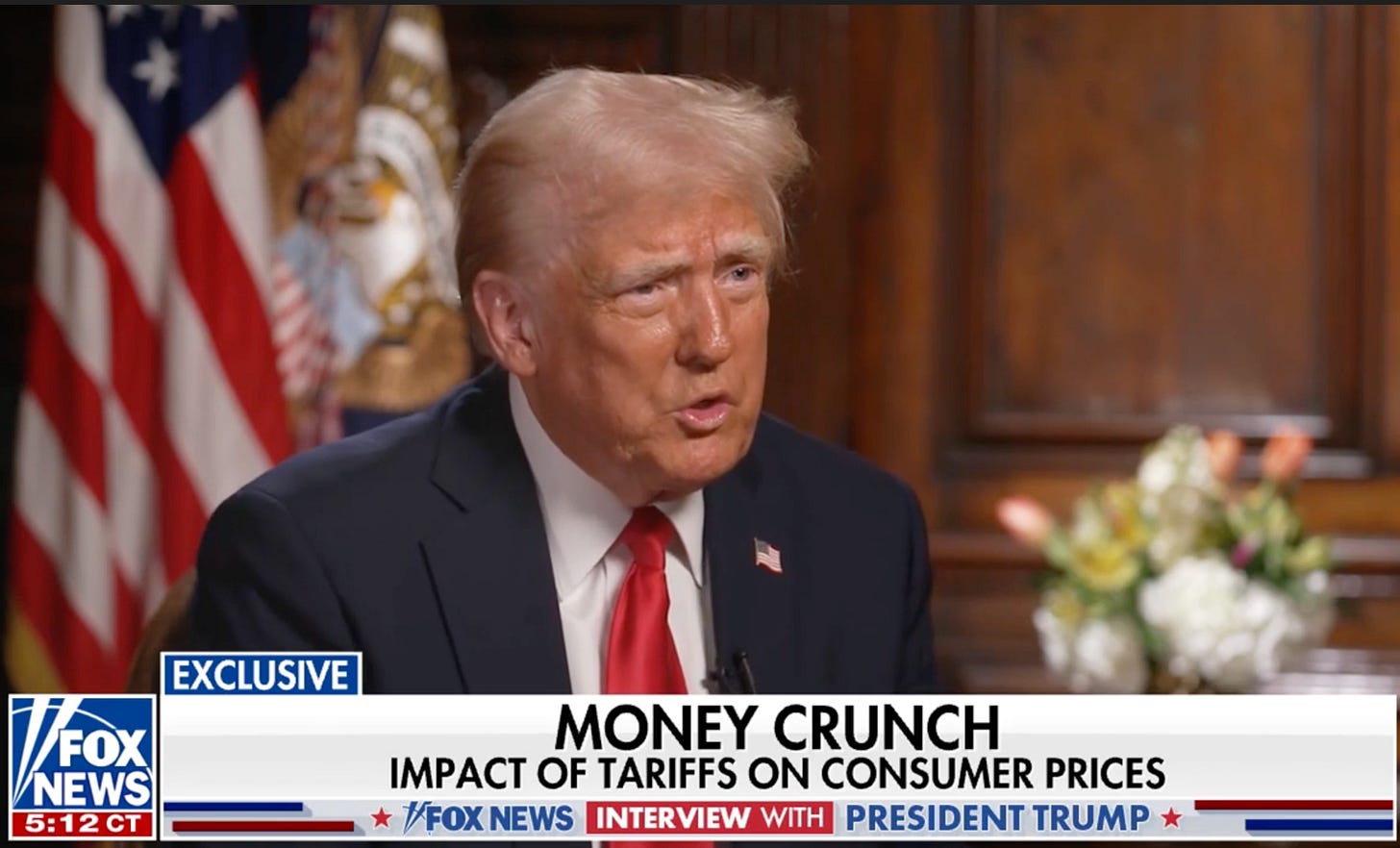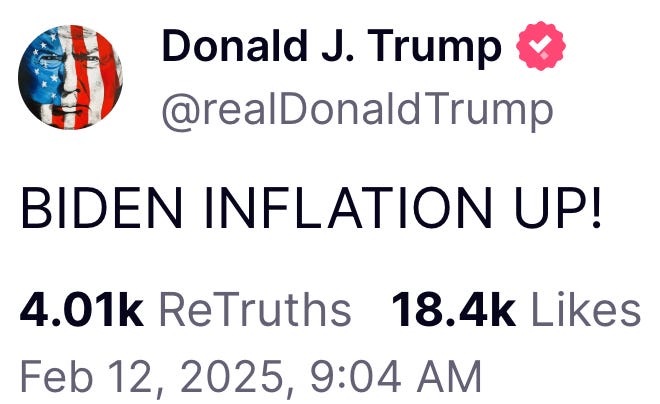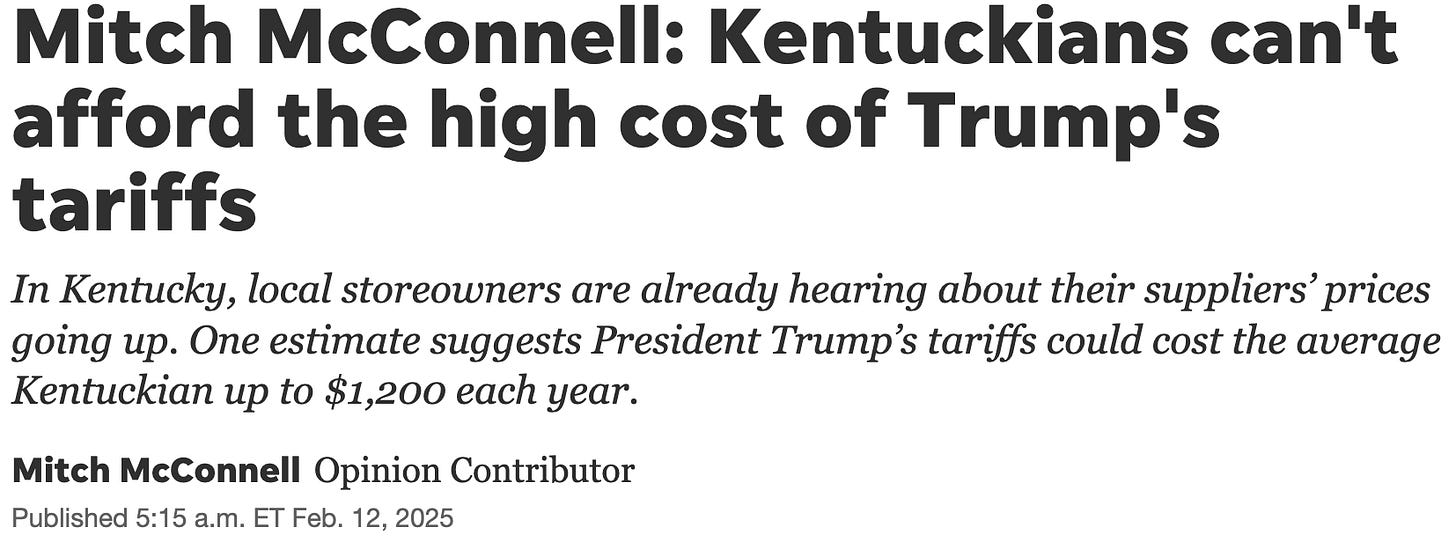Trumpflation Has Come for MAGA
Trump's biggest fans are going to pay for his victory

“When I win, I will immediately start bringing prices down on day one,” Donald Trump said during the campaign.
Voters believed him, despite his implausible explanations.
Then, today, we learned that inflation actually increased during January, the last 34% of which was during Trump’s presidency.
According to the Trump Labor Department, the Consumer Price Index, the primary measure of inflation, rose 0.5% in January compared to December. That means energy, lodging, and food are all more expensive. Despite Trump’s pledge, there’s no indication he started bringing prices down on day one or any of the subsequent days.
In fact, the monthly inflation numbers are higher than was expected.
Ignoring his promise to lower prices starting on day one, Trump responded to the new inflation numbers this morning by blaming the not-president, Joe Biden.
But y’know who thinks the current inflation is the fault of the current president? Well, Democrats, clearly, but not just Democrats.
Sen. Mitch McConnell (R-KY) was the Republican leader until the very last days of the Biden presidency. Here’s what he had to say in an op-ed piece that he wrote for his Kentucky voters back home today:
You may also have heard economists warning that Trump’s policies will make inflation worse, rather than better. But it’s considerably worse than you’ve probably heard.
By now, everyone understands that tariffs will add to costs. Even Trump has admitted this possibility, which makes sense because the entire point of tariffs is to raise prices. Making imported goods (which are made more cheaply overseas) more costly here helps American companies compete because now they, too, can raise prices (on expensively-produced domestic products) enough to make a profit without getting undersold.
As Trump himself said, tariffs may cause “some pain.” He promises, though, that “It will all be worth the price that must be paid” and that the results will be “SPECTACULAR!!!” He just doesn’t say when. Or how.
His tax plans, too, stand to make inflation worse. Lower corporate rates could make price-fixing and collusion more profitable, incentivizing executives to jack up prices more than they already do, because they’ll get to keep more of the profits.
The reduced revenue from Trump’s tax rates, meanwhile, could spook the bond markets, potentially roiling the global economy, which rarely gets roiled in good ways.
Trump’s immigration policies — if he can get deportation numbers up beyond those under Biden — also stand to make inflation worse.
For American manufacturers — of everything from food to crap — to keep making stuff, they’ll need to hire people to replace those deported workers. With fewer people competing for those jobs, wages will likely go up, which means prices will, too.
The same is true for every step on America’s supply and distribution chains. Fewer immigrants to tend to cattle. To kill them. To cut them up. To package them. To ship it. To stock it on the shelves or cook it. To bring it to your table or ring it up at the checkout. At every step of the way, labor shortages = wage increases.
Even the Trump policies specifically intended to bring down prices look highly specious.
One Trump plan is to increase drilling, boosting the supply of oil and thereby bringing down prices. Couple problems with that plan, too.
When gas prices plunged during the pandemic, Trump flew into action…to raise them again. He rode to the rescue of the gas companies by getting Saudi Arabia and Russia to cut back on production so that Americans would pay more at the pump.
So, U.S. oil companies don’t especially want to drill more. Why spend more to drill more and sell more — if lower prices mean you don’t profit more?
The Wall Street Journal reported last year that gas companies say what they really want is for Trump to give consumers fewer options, so they have to buy gas. That means killing electric-vehicles and sustainable-energy options.
So Trump is doing everything he can to block further implementation of the Inflation Reduction Act, which, not surprisingly, means not reducing inflation. Not surprisingly, it’s Trump voters who will be hit hardest, as that’s where more of the money was going.
And it’s already happening. Trump is clawing back grants and freezing funds that were in the pipeline (sorry) that was spurring private investment in sustainable, and cheaper energy.
The month after Trump won, economic analysts predicted his policies would mean higher prices. “[U]pside risks to the inflation outlook had increased,” the Federal Reserve concluded at its December meeting.
Based on all these factors, people already expect prices to go up. Consumer expectations of inflation jumped this month from January.
“Higher prices from tariffs are the number one financial concern for Americans,” Navy Credit Union Corporate Economist Robert Frick, not a Communist hippie, told CNBC.
But there’s a lot more to it than just the policies that corporate media and Wall Street are talking about.
The federal government works to keep prices down in myriad ways that are largely invisible but about to become pretty damn visible as Trump torches them.
One is monopolization. When companies control markets, there’s no competition to push their prices down.
Vice Pres. JD Vance had actually been a fan of Pres. Joe Biden’s Federal Trade Commission (FTC) Chair Lina Khan. She was an antitrust champion the likes we haven’t seen in a while. But now she’s gone, and there’s no sign that the FTC or Justice Department is interested in picking up the gauntlet and standing in the way of corporate consolidation.
That means more mergers, more acquisitions, more big companies buying up possible competitors. Which all translates to reduced competition and higher prices.
Then there are the virtual monopolies: When ostensible rivals act like they’re one company. For instance, they exchange info with each other so that none of them lowers prices in a way that forces others to, as well.
It’s not just raving anarchists making these accusations. It’s big companies who also have to pay those jacked-up prices, too. Like, McDonald’s has made these accusations, too.
It’s basically price-fixing, collusion, and there’s less appetite to prosecute that, too. Plus, it’s gotten much more sophisticated.
Instead of colluding directly, ostensible rivals can now contract with a third-party data-analysis company to get info about their markets. It’s basically collusion by proxy, because the rivals all share their info with the data-analysis company…which then generates “reports” about the market — price-fixing with a middleman to make the guilt less obvious.
The Biden administration cracked down on and fined those companies, especially in livestock and agriculture. Do you think that’ll be a priority for the Trump administration, which has vowed to remove the regulations that stop this kind of thing?
And y’know what else will make people’s expenses more, um, expensive? If buying on credit becomes more expensive — because the fees go up, or the rates get trickier, or the fine print gets finer. That’s exactly what the Consumer Financial Protection Bureau used to police. Trump just shut them down.
And does anyone think that Trump will go after the financial firms gobbling up housing stock? Because rising costs for roof-having accounted for about 30% of the January inflation spike.
But wait, there’s more. Prices are affected by more than supply and demand. Wall Street not only has futures markets to bet on commodity prices, they’ve set up additional casinos betting on derivatives of those futures prices.
So, it’s not just that oranges get traded. Wall Street also bets on future orange prices. And now they also bet on derivatives tied to future orange prices. It’s like sports betting, only not just on who wins, or the over-under, but on crazy shit like how many times LeBron scratches his nose.
How does all that betting affect inflation? If those derivatives and futures bets all move in one direction, that can affect the price of real oranges. If everyone bets, for instance, that orange prices will go up, someone’s gonna start investing in oranges.
When there’s so much betting that the casino is ten times bigger than the orchards, actual supply and demand matters less and less. This isn’t hypothetical.
It happened with oil prices. And a former federal regulator told me it already happened with inflation back in 2022. That was thanks to a loophole which Trump didn’t create … but he did protect it in his first term (and, in fairness, Biden didn’t fix it).
So now, Wall Street stands to have free rein for another four years to gamble on orange futures. And our futures.
Jonathan Larsen is a longtime TV news producer and journalist who’s worked at MSNBC, CNN, The Daily Show, Air America Radio, and The Young Turks.






Chrumps.
Not concerning at all … sigh. Another great in-depth piece. So hard not getting defeated. I keep waiting for these Trump voters and non-voting enablers to feel the effects of what they did, but what if the economy or corps are too far gone by then?
I can’t drive at the moment and live in a rural area, where Dollar General serves as my only store within 15 miles, so not renewing my Amazon Prime was my latest protest. I only take one medication my doctor recently prescribed, which is just Pepcid essentially at strong dose, and I was ordering OTC kind through Amazon but thought I would just try the home delivery Rx through my Florida Blue. Logged in and it took me to … Amazon Pharmacy, the only Rx home delivery option. Cue Meg Tilly in Body Snatchers.